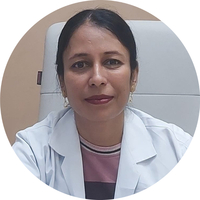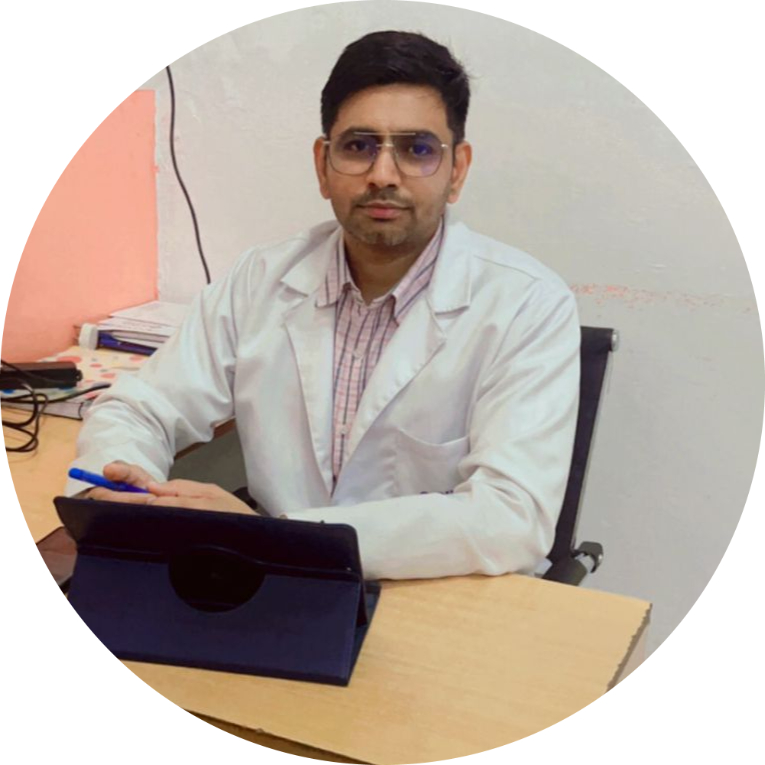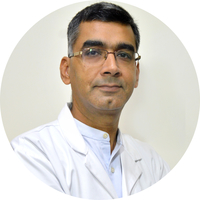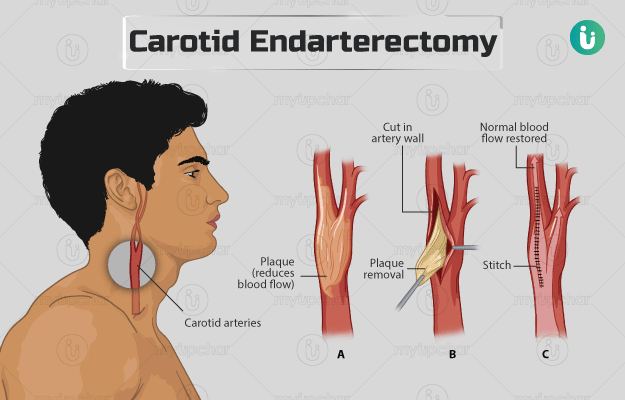Summary
Carotid endarterectomy (CEA) is performed to remove plaques in the carotid artery - the artery that supplies blood to the face and the brain. Plaque formation leads to narrowing of the carotid artery and reduces blood supply to the brain, which, in turn, could cause a stroke.
Before performing CEA, certain diagnostic tests, such as ultrasound, angiography, magnetic resonance angiography or computed tomography angiography, may be required. You will need to stop blood-thinning medications and smoking before the surgery. The surgery may be done under local or general anaesthesia. After the surgery, care should be taken to keep the surgical site clean and dry. You will have to exercise and make changes in your lifestyle and food habits to prevent the plaque formation in future.
- What is carotid endarterectomy?
- Why is carotid endarterectomy recommended?
- Who can and cannot get a carotid endarterectomy?
- What preparations are needed before a carotid endarterectomy?
- How is carotid endarterectomy done?
- How to care for yourself after a carotid endarterectomy?
- What are the possible complications/risks of a carotid endarterectomy?
- When to follow up with your doctor after a carotid endarterectomy?
What is carotid endarterectomy?
Carotid endarterectomy (CEA) is a surgical procedure for the treatment of carotid artery disease. Carotid arteries are present on both sides of the neck. They supply oxygen and blood to the brain and face. If you have a plaque in the carotid artery, it will narrow your artery and prevent the blood flow to your brain. A plaque is made of cholesterol, calcium, fibrin (an insoluble protein formed during clotting of the blood) and fatty substances. Our brain needs continuous oxygen and nutrient supply for efficient working; blockage in the blood supply will cause brain cell death and may lead to stroke.
During CEA, the plaque is removed, and the blood supply to the brain is restored.
Why is carotid endarterectomy recommended?
Your healthcare practitioner will perform this surgery if you have carotid artery disease. This disease may cause the following:
-
Transient ischaemic attack or mini-stroke: The transient ischaemic attack shows stroke-like symptoms that usually last for 24 hours. It is the first sign that indicates carotid artery disease. The symptoms are as follows:
- Loss of balance or dizziness
- Severe headache
- Sudden trouble in seeing with one or both eyes
- Difficulty speaking or understanding speech
- Unexpected weakness or numbness in the limbs or face (usually only on one side of the body)
- Inability to move
- Stroke: A stroke may show symptoms similar to that of a mini-stroke. However, it can cause more serious conditions as follows:
- Long-term vision or speech problems
- Long-term brain damage
- Paralysis (inability to move)
- Bruit: On examining the carotid arteries with a stethoscope, if a whooshing sound called a bruit is heard, it indicates reduced blood flow to the carotid arteries.
Who can and cannot get a carotid endarterectomy?
A person who has had radiation therapy to the neck may not be advised to undergo CEA.
What preparations are needed before a carotid endarterectomy?
Before performing this surgery, you will need the following preparation:
-
Medical examination: Your healthcare practitioner will review your medical history and do a physical health checkup. You may need the following diagnostic tests before the surgery:
- Blood test
- Carotid ultrasound
- Carotid angiography
- Magnetic resonance angiography
- Computed tomography angiography
- Medications:
- Inform your healthcare practitioner about any prescribed, non-prescribed medicines or herbal supplements you take.
- Your healthcare practitioner may ask you to discontinue taking blood-thinning medicines such as ibuprofen and aspirin a few days before the surgery.
- Inform your doctor if you are allergic to iodine, contrast dye, any medicine, latex tape or anaesthesia
- Lifestyle:
- You will be asked to quit smoking before the surgery to help you recover faster
- Inform your healthcare practitioner if you have a pacemaker implanted in your chest.
- If you are or could be pregnant, tell your doctor before the surgery
- Also, inform your doctor about any illness that you had recently, which includes flu, fever or cold
You may be given instructions on fasting before the procedure. Your doctor will ask you to sign a consent form giving him your permission to perform this surgery.
How is carotid endarterectomy done?
You will need to be admitted in the hospital the day before the surgery or on the morning of surgery.
The following steps are performed before the surgery:
- You will have to remove any object or jewellery that may interfere with the surgical procedure and wear a hospital gown.
- An intravenous (IV) line will be passed through your hand or arm.
- A catheter (thin tube) will be placed in your wrist to take a blood sample and monitor blood pressure.
- To monitor your heart, you may have another catheter in your neck, under the collarbone or the groin.
- A catheter will also be inserted in your bladder to help you urinate.
- You will have to lie on the operating table with your head slightly raised and turned in the opposite direction as that of your surgical site.
- A healthcare practitioner may shave the surgical site.
- You will be given a dose of antibiotics to prevent infection.
The following steps are taken during anaesthesia:
- You may have local or general anaesthesia.
- If you are under local anaesthesia, you will feel sleepy and a sensation of numbness near the surgical site. You will be given sedatives to help you relax during the surgery.
- If you are given general anaesthesia, you will be completely asleep during the surgery. A breathing tube will be passed through your throat into your windpipe to supply air to your lungs. Your breathing will be taken care of through a machine called a ventilator.
The following steps are performed during the surgery:
- A healthcare practitioner will clean your skin over the surgical site with an antiseptic solution.
- A surgeon will make an incision (cut) on the side of your neck.
- Once the diseased artery is exposed, the surgeon will cut it using surgical tools. A small tube called shunt will be used to divert the blood flow around the surgical site so that blood supply to the brain is uninterrupted.
- Next, the surgeon will remove the plaque from your carotid artery.
- He/she will remove the shunt, close the artery and stitch up the incision.
- The surgeon will place a drain in your neck to remove any blood collected there.
- You will be given blood pressure medicines through the IV line.
- If you were given general anaesthesia, the doctor will wake you up in the operating room to see if you can respond to their questions.
- Finally, a healthcare practitioner will cover the surgical site with sterile bandage or dressing.
The following steps are performed after the surgery:
- You will be shifted to either the intensive care unit or your hospital room depending on your condition after the surgery.
- The doctor may remove the drainage tube in your neck the next morning after the surgery.
- You may be given solid food when you can handle it properly.
- You may be given medicines to relieve the pain.
CEA takes one to two hours. You can go home one to two days after the surgery.
How to care for yourself after a carotid endarterectomy?
After returning home, the following care is expected:
-
Wound care:
- Keep your incision clean and dry.
- If adhesives have been used for wound dressing, keep the adhesive tapes dry. They will fall off on their own.
- Avoid soaking, scrubbing or having shower water beat on these tapes.
- Carefully look if there are any changes in your incision every day.
- Avoid lotion, cream or herbal remedies on the incisions.
- Do not wear turtlenecks or clothes that rub your neck till the incisions heal.
- Activities:
- You can resume your daily activities in three to four weeks. However, you may have slight neck pain for up to two weeks.
- Avoid driving till you can move your head without discomfort or when your incisions heal.
- You may need some help while performing activities, such as eating, shopping or taking care of the house.
- Medications:
- You will be given cholesterol-lowering medicines and aspirin or other medicines to prevent blood clots.
- Diet:
- You would be asked to take a low-fat and low-cholesterol diet.
- Avoid processed or packed food items. Instead, add more fruits, vegetables, low- or non-fat dairy products or lean meat in your diet.
Carotid endarterectomy will lower your risk of getting a stroke. However, you will need to change your diet, start exercising, and modify your lifestyle habits, such as quitting smoking, to prevent plaque formation in future.
When to see the doctor?
Call your healthcare practitioner if you have the following symptoms:
- Sudden severe headache
- Sudden slurred speech or trouble talking
- Sudden double vision or trouble in seeing through one or both eyes
- Weakness, tingling or loss of sensation on one side of your face or body
- Trouble swallowing
- Swelling in the leg
- Fever over 101°F
- Dizziness, chest pain or shortness of breath
- Blood or yellow or green mucus in cough
What are the possible complications/risks of a carotid endarterectomy?
The following risks are associated with this surgery:
- Heart attack
- High blood pressure
- Seizures
- Stroke or mini-stroke
- Bleeding into the brain
- Infection
- Re-blockage of the carotid artery
- Nerve issues
- Swelling due to the accumulation of the blood in the tissues around the incision site
- Bleeding at the surgical site
When to follow up with your doctor after a carotid endarterectomy?
You should follow up with your doctor 1-2 weeks post-surgery to check your medicines. Stitches, if present, will be removed during this visit. You may need to follow up with your doctor regularly to monitor your health so that any problems can be treated in a timely manner.
Disclaimer: The above information is provided purely from an educational point of view and is in no way a substitute for medical advice by a qualified doctor.
Find Otolaryngologist in cities
Surgery Cost In Your City
Doctors for Carotid endarterectomy

Dr. Varalakshmi Govindappa
ENT
22 Years of Experience

Dr. Anu Goyal
ENT
25 Years of Experience

Dr. Manish Gudeniya
ENT
8 Years of Experience

Dr. Manish Kumar
ENT
17 Years of Experience
References
- Johns Hopkins Medicine [Internet]. The Johns Hopkins University, The Johns Hopkins Hospital, and Johns Hopkins Health System; Carotid Endarterectomy
- Biller J, Ruland S, Schneck MJ. Ischemic cerebrovascular disease. In: Daroff RB, Jankovic J, Mazziotta JC, Pomeroy SL, eds. Bradley's Neurology in Clinical Practice. 7th ed. Philadelphia, PA: Elsevier; 2016:chap 65.
- Brott TG, Howard G, Roubin GS, et al. Long-term results of stenting versus endarterectomy for carotid-artery stenosis. N Engl J Med. 2016;374(11):1021-1031. PMID: 26890472.
- Brott TG, Halperin JL, Abbara S, et al. 2011 ASA/ACCF/AHA/AANN/AANS/ACR/ASNR/CNS/SAIP/SCAI/SIR/SNIS/SVM/SVS guideline on the management of patients with extracranial carotid and vertebral artery disease: executive summary: a report of the American College of Cardiology Foundation/American Heart. Catheter Cardiovasc Interv. 2013;81(1):E76-E123. PMID: 23281092.
- Arnold M, Perler BA. Carotid endarterectomy. In: Sidawy AN, Perler BA, eds. Rutherford's Vascular Surgery and Endovascular Therapy. 9th ed. Philadelphia, PA: Elsevier; 2019:chap 91.
- Perler BA. Carotid endarterectomy. In: Cameron JL, Cameron AM, eds. Current Surgical Therapy. 12th ed. Philadelphia, PA: Elsevier; 2017:937-941.
- UCSF Department of Surgery [internet]. University of California San Francisco. California. U.S.A.; Carotid Endarterectomy
- DaCosta M, Tadi P, Surowiec SM. Carotid Endarterectomy. [Updated 2020 Feb 27]. In: StatPearls [Internet]. Treasure Island (FL): StatPearls Publishing; 2020 Jan
- Texas Heart Institute [Internet]. Houston. Texas. US; Carotid Endarterectomy
- Kinlay S, Bhatt DL. Treatment of noncoronary obstructive vascular disease. In: Zipes DP, Libby P, Bonow RO, Mann, DL, Tomaselli GF, Braunwald E, eds. Braunwald's Heart Disease: A Textbook of Cardiovascular Medicine. 11th ed. Philadelphia, PA: Elsevier; 2019:chap 66.
- Cheng CC, Cheema F, Fankhauser G, Silva MB. Peripheral arterial disease. In: Townsend CM Jr, Beauchamp RD, Evers BM, Mattox KL, eds. Sabiston Textbook of Surgery. 20th ed. Philadelphia, PA: Elsevier; 2017:chap 62.
- University Health Network [Internet]. Toronto. Canada; After Your Carotid Endarterectomy















